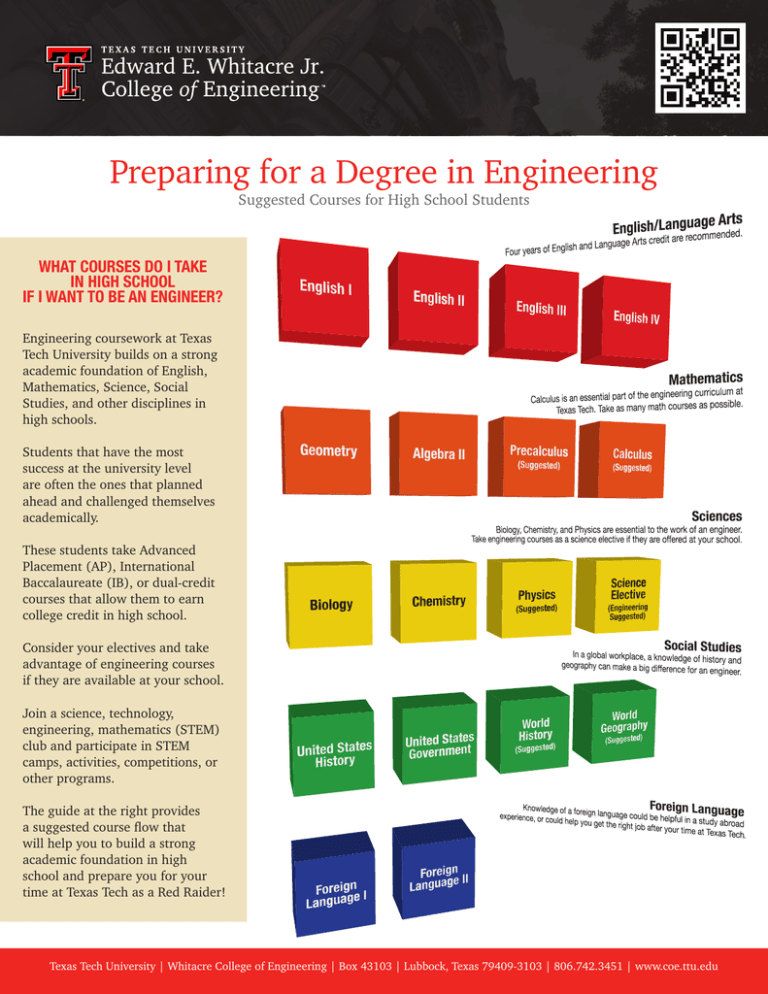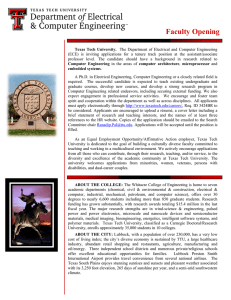Preparing for a Degree in Engineering WHAT COURSES DO I TAKE
advertisement

Preparing for a Degree in Engineering Suggested Courses for High School Students WHAT COURSES DO I TAKE IN HIGH SCHOOL IF I WANT TO BE AN ENGINEER? Engineering coursework at Texas Tech University builds on a strong academic foundation of English, Mathematics, Science, Social Studies, and other disciplines in high schools. Students that have the most success at the university level are often the ones that planned ahead and challenged themselves academically. These students take Advanced Placement (AP), International Baccalaureate (IB), or dual-credit courses that allow them to earn college credit in high school. Consider your electives and take advantage of engineering courses if they are available at your school. Join a science, technology, engineering, mathematics (STEM) club and participate in STEM camps, activities, competitions, or other programs. The guide at the right provides a suggested course flow that will help you to build a strong academic foundation in high school and prepare you for your time at Texas Tech as a Red Raider! Texas Tech University | Whitacre College of Engineering | Box 43103 | Lubbock, Texas 79409-3103 | 806.742.3451 | www.coe.ttu.edu Preparing for a Degree in Engineering How Engineers Shape the World From pharmaceuticals that can improve lives to green chemistry that may help remove hazardous substances, chemical engineers transform the knowledge of chemistry into powerful materials for the betterment of society. From designing modern skyscrapers, roadways, and manufacturing processes to ensuring clean drinking water, civil, environmental, and construction engineers affect quality of life and public safety. Computer scientists design and build software and create efficient solutions to real-world problems in fields such as robotics, computer-enhanced vision, and digital forensics. polymers and materials, nano-technology, energetic nanomaterials, biotechnology and biomedical engineering, biomolecular modeling, alternative new generation biofuels design of buildings, shelters and bridges; windstorm damage mitigation; renewable wind energy systems; wastewater treatment, hazardous waste treatment, flooding, water resources management, construction management, manufacturing processes, HVAC system design programming languages, distributed computing and parallel processing, artificial intelligence techniques, intelligent systems, robotics, software engineering, distributed databases pulsed power systems, optoelectronics, computer vision and image processing, energy and power systems, medical microelectronics, embedded systems, wireless communications, sustainable energy systems Electrical and computer engineers work with electronics, telecommunications and integrated circuits – from generating electrical power for the national grid, to novel integrated circuits for wireless communications, to designing the smallest computer chip in your cell phone. From improving patient flow at a hospital to consulting with Fortune 500 companies on management strategies, manufacturing, ergonomics, and logistics, industrial engineers design and operate systems, providing high-quality products and services in safe and cost-effective ways. Mechanical engineers design, manufacture, and test mechanical devices from submarines to tiny nanobot devices and artificial organs. Petroleum engineers literally fuel the world – finding and producing safe, clean and affordable oil and gas supplies – all while safeguarding the environment. biomechanics, safety, nanomaterials, environmentally conscious manufacturing, management of technology and complex organizations, operations research energetics, biomechanics, superhard materials, nanomechanics, computational and environmental fluid mechanics, fuel cells and alternative fuels in automotive design, MEMs core analysis; pressure, volume, temperature (PVT) analysis; natural gas engineering; artificial lift and system analysis; reservoir engineering, hyrdraulic fracking, fluidless fracking, surface operations and facilities design Texas Tech University | Whitacre College of Engineering | Box 43103 | Lubbock, Texas 79409-3103 | 806.742.3451 | www.coe.ttu.edu


